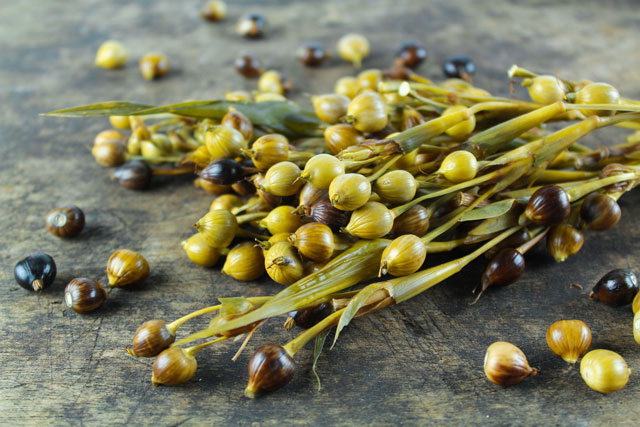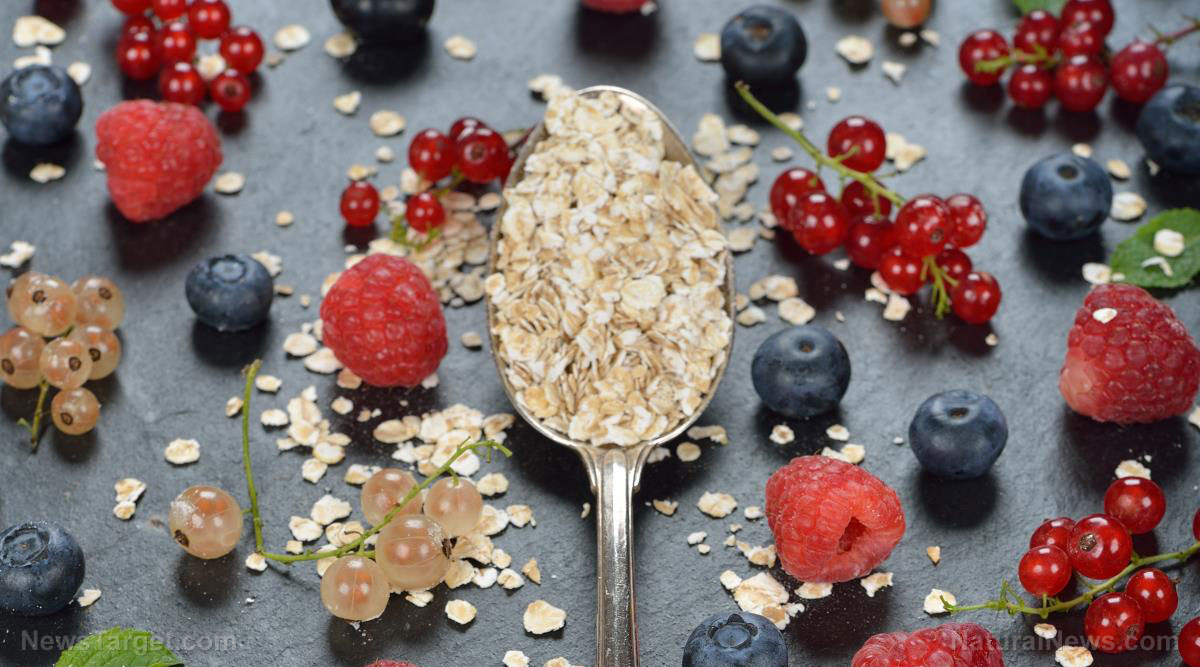Ginger: The healing superfood bridging ancient wisdom and modern science
04/16/2025 / By Ava Grace

- Ginger is a key herb in traditional medicine, and modern research has confirmed its anti-inflammatory, antioxidant, and antimicrobial properties. It effectively alleviates nausea, combats chronic inflammation and supports digestive health.
- Ginger can be consumed fresh, dried or as a supplement. It is popular for its digestive benefits and is often used as a natural remedy for colds and sore throats.
- Emerging research suggests ginger may help manage blood sugar levels and improve cardiovascular health by reducing oxidative stress and lowering LDL cholesterol and triglycerides.
- Ginger, known by various names across cultures, was highly valued in ancient times and widely used as a spice and a natural remedy for illnesses. Its rich history highlights its enduring appeal and versatility.
- Ginger’s culinary uses are diverse. It can add depth to savory dishes like salmon and soups, and sweet treats like gingerbread cookies and energy bites, making it a versatile and flavorful ingredient in both traditional and contemporary cooking.
Ginger, scientifically known as Zingiber officinale, is a flowering plant whose rhizome has been used for centuries as a culinary spice and natural medicine. This herbaceous perennial, native to Southeast Asia, grows annual pseudostems up to one meter tall, adorned with narrow, blade-like leaves.
But it is the knobby, aromatic rhizome beneath the soil that has captured the attention of healers, chefs and wellness enthusiasts alike. From its vibrant flavor to its therapeutic properties, ginger is a true superfood that bridges the gap between ancient wisdom and modern science.
Brief history of ginger
Ginger is known by various names across cultures, reflecting its global significance. In Sanskrit, it is called srngaveram, while in Arabic, it is referred to as zanjabil. In Traditional Chinese Medicine (TCM), it is known as sheng jiang. These names highlight ginger’s deep roots in diverse healing traditions.
Visually, ginger is unmistakable. Its rhizome is beige to light brown on the outside and has a fibrous texture. When cut open, it reveals a pale yellow interior. The shape of ginger root is irregular, often resembling a twisted knot or a hand with outstretched fingers.
The taste of ginger is equally distinctive — spicy, pungent and slightly sweet. Its warmth lingers on the palate, making it a beloved ingredient in both savory and sweet dishes.
Ginger’s history is as rich as its flavor. During the height of the Silk Road, ginger was one of the most prized commodities traded between Asia, the Middle East and Europe. It was so valuable that a pound of ginger was equivalent to the price of a sheep in medieval England.
Traders braved treacherous routes to bring this precious spice to distant lands, where it was used not only for cooking but also as a remedy for the plague and other illnesses. This ancient spice’s journey is a testament to its enduring appeal and versatility.
Healing power of ginger
Ginger has long been revered in traditional medicinal systems, such as Ayurveda and TCM, for its ability to address a wide range of ailments. Modern research has begun to validate many of these claims, revealing ginger’s potent anti-inflammatory, antioxidant and antimicrobial properties. (Related: Ginger: The enemy of type 2 diabetes.)
One of ginger’s most well-documented benefits is its ability to alleviate nausea and vomiting. Studies have shown that ginger can effectively reduce symptoms of motion sickness, morning sickness during pregnancy and nausea induced by chemotherapy. Its active compounds, such as gingerol and shogaol, interact with the digestive and nervous systems to calm the stomach and reduce the sensation of queasiness.
Ginger is also a powerful ally in combating inflammation. Chronic inflammation is a root cause of many diseases, including arthritis, heart disease and certain cancers. Ginger’s bioactive compounds inhibit the production of pro-inflammatory cytokines, making it an effective natural remedy for osteoarthritis and rheumatoid arthritis. Regular consumption of ginger has been shown to reduce joint pain and improve mobility in individuals with these conditions.
For those struggling with digestive issues, ginger can be a game-changer. It stimulates saliva, bile and gastric enzymes, aiding in the breakdown of food and promoting smoother digestion. Ginger is particularly effective in relieving bloating, gas and indigestion. Its carminative properties help expel gas from the intestines, providing relief from discomfort.
Emerging research also suggests that ginger can help diabetics manage their blood sugar levels and improve cardiovascular health. Its antioxidant properties help reduce oxidative stress, a key factor in the development of diabetes and heart disease. Additionally, ginger has been shown to lower LDL cholesterol and triglycerides, further supporting heart health.
Ways to use ginger as a natural remedy
Ginger’s versatility makes it easy to incorporate into daily life. It can be consumed fresh, dried, powdered or as an oil or juice. Many people brew ginger tea by steeping fresh ginger slices in hot water, often adding honey or lemon for extra flavor. This soothing beverage is a popular remedy for colds, sore throats and digestive discomfort.
Ginger supplements, available in capsule or tablet form, are another convenient option for people seeking to enjoy ginger’s therapeutic benefits. Ginger oil, meanwhile, can be used in massage therapy to relieve muscle pain and stiffness. Its warming effect helps improve circulation and reduces inflammation when applied topically.
Note that it’s important to consult your healthcare provider before starting any supplement regimen, especially if you’re taking medications or have underlying health conditions.
Ginger in the kitchen: recipes to try
Ginger’s culinary applications are endless. Here are some recipes that showcase ginger’s versatility:
- Ginger-turmeric immunity soup – A warming broth infused with fresh ginger, turmeric, garlic and vegetables.
- Ginger-lemon energy bites – A no-bake snack made with oats, dates and a kick of ginger.
- Honey-ginger glazed salmon – A savory-sweet dish featuring a ginger-infused glaze.
- Gingerbread cookies – A holiday classic with a spicy twist.
- Ginger-infused green smoothie – A refreshing blend of spinach, pineapple and fresh ginger.
Ginger is more than just a spice — it’s a testament to the power of nature to heal and nourish. Whether used to soothe an upset stomach, reduce inflammation or add depth to a recipe, ginger continues to prove its worth as a versatile and potent superfood. Its rich history, distinctive flavor and many health benefits make it a valuable addition to your pantry and medicine cabinet.
This story is not medical advice and is not intended to treat or cure any disease. Always consult with a qualified naturopathic physician for personalized advice about your specific health situation or concern.
For more fascinating insights into superfoods and their natural wonders, visit NaturalNews.com. It’s a treasure trove of articles that will deepen your understanding of the healing power of food.
If you’re into cutting-edge technology with a health twist, try Brighteon.ai. Created by Mike Adams, the Health Ranger, this AI model is a free download that you can run on your own device. It’s all about sharing knowledge freely and bypassing the filters of censorship.
And if you’re looking for a place to openly discuss everything from nutrition to natural remedies without any holds barred, Brighteon.com is your go-to spot. Don’t forget to check out their free speech social media platforms, Brighteon.IO and Brighteon.social, where the conversation is always lively and uncensored.
Watch this video to learn more about the benefits and uses of organic ginger.
This video is from the Health Ranger Store channel on Brighteon.com.
More related stories:
Ginger improves symptoms of ulcerative colitis, enhances quality of life.
Ginger found to help lower risk of hypertension and coronary heart disease.
Ginger: Prevent and treat common diseases with this powerful natural medicine.
Ginger found to be effective against many different types of cancer.
Sources include:
Submit a correction >>
Tagged Under:
alternative medicine, food cures, food is medicine, food science, functional food, ginger, grocery cures, health science, herbal medicine, Herbs, ingredients, natural cures, natural health, natural medicine, plant medicine, remedies
This article may contain statements that reflect the opinion of the author
RECENT NEWS & ARTICLES
COPYRIGHT © 2017 NATURAL HEALTH NEWS




















